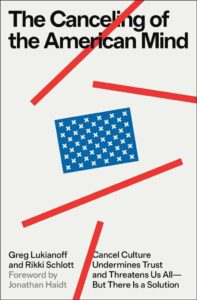Book burying under White House pressure 3
According to a New York Post article, the White House successfully pressured Amazon to put some books under a “do not promote” order. The books remained available but presumably are less discoverable than comparable books not under the order. The order was issued “the same day Amazon officials met with the White House.”
The order covers “anti-vax books whose primary purpose is to persuade readers vaccines are unsafe or ineffective.” The article doesn’t mention any titles, so I can’t judge their worth. Would a book that called attention to legitimate risks or exaggerated claims of effectiveness fall under that category? Biden said, “You’re not going to get COVID if you have these vaccinations,” a claim whose inaccuracy many people have learned firsthand.
(more…)
 Cancel culture is a prominent, ugly feature of public discourse today, yet many claim it doesn’t exist. They say there are only “consequences,” which amounts to saying that if you’re subjected to abuse because you said something controversial, what else did you expect?
Cancel culture is a prominent, ugly feature of public discourse today, yet many claim it doesn’t exist. They say there are only “consequences,” which amounts to saying that if you’re subjected to abuse because you said something controversial, what else did you expect?